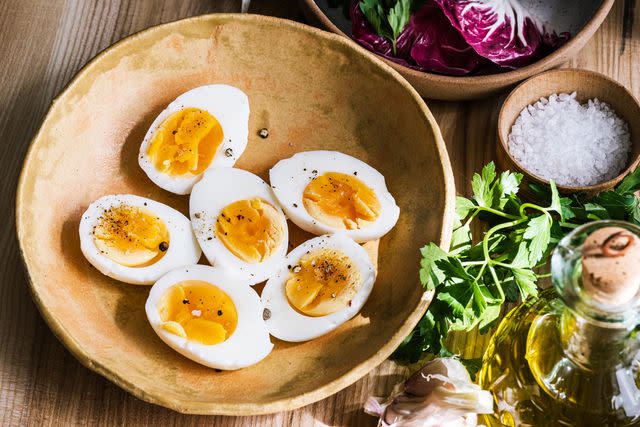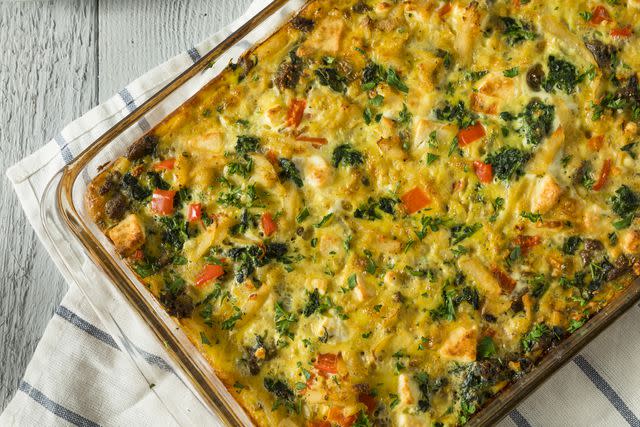The Healthiest Way to Prepare an Egg
Medically reviewed by Kayla Girgen, RD
Eggs are a nutrient-dense food, relatively low in calories but packed with proteins, vitamins, and minerals that support overall health. Their cholesterol content has been a source of controversy in the past, but eggs offer many potential health benefits when included in a well-balanced diet. They can help improve skeletal muscle, protect against infection, act as a hypotensive agent (lowering blood pressure), and play a role in weight management.

Tatiana_Didenko / Getty Images
That said, how they're prepared can affect their nutrition profile. Although the nutrition profile doesn't change much depending on the cooking method unless other ingredients are added (like butter for scrambled eggs, for example), the exposure to high-heat temperatures can break down essential nutrients like antioxidants, vitamins, and minerals.
Here are the healthiest ways you can prepare an egg.
1. Poached Eggs

Naomi Rahim / Getty Images
When it comes to maximizing their nutrients, poaching is one of the healthiest ways to cook eggs. Poached eggs are exposed to low-level heat for a short amount of time, keeping the egg yolks intact and limiting the risk of oxidizing cholesterol. Research has even linked poached eggs to improved protein digestibility.
To poach an egg, bring a pot of water to a rolling simmer. Using a whisk, stir the water to get it spinning. Crack an egg into the water and let it cook to your liking, usually around 1-3 minutes. Adding a tablespoon of vinegar to the water helps hold the egg together and doesn't impact the flavor. Poached eggs pair well with roasted vegetables and toast.
One large poached egg provides:
Calories: 72
Protein: 6.3 grams (g)
Carbohydrates: 0.4 g
Fat: 4.7 g
Vitamin A: 80 micrograms (mcg)
Vitamin D: 1 mcg
Choline: 117 milligrams (mg)
Related: 6 Foods That Are High in Cholesterol
2. Boiled Eggs

istetiana / Getty Images
Boiling eggs encompasses many possibilities, as the longer an egg is boiled, the more firm its texture will be. Soft-boiled eggs usually take around 6 minutes to cook and will have a soft yolk, while hard-boiled eggs typically take at least 10 minutes to cook and will have a more firm yolk.
Boiled eggs do not incorporate any fats or oils during the cooking process, so they are a nutritious and convenient source of protein. Plus, cooking the yolk helps reduce the risk of contracting a Salmonella infection.
Boiled eggs can be enjoyed on their own or as part of a well-balanced meal or snack. They pair well with whole-grain toast, sliced avocado, and fresh vegetables.
One hard-boiled egg provides:
Calories: 78
Protein: 6.3 g
Carbohydrates: 0.6 g
Fat: 5.3 g
Vitamin A: 74.5 mcg
Vitamin D: 1.1 mcg
Choline: 147 mg
3. Scrambled Eggs

MarianVejcik / Getty Images
Scrambled eggs are usually cooked in a skillet over low heat, helping preserve the eggs' nutrients. The resulting soft egg curds are a light and fluffy way to enjoy high-quality protein and many other nutrients.
Scrambled eggs pair well with many foods, making them a blank canvas for your breakfast plate. For example, adding milk and cheese when scrambling eggs can boost the protein and fat content of the dish, while adding fresh vegetables can increase the fiber content.
One large scrambled egg contains:
Calories: 91
Protein: 6.1 g
Carbohydrates: 1 g
Fat: 6.7 g
Vitamin A: 98.2 mcg
Vitamin D: 1.1 mcg
Choline: 135 mg
4. Baked Eggs

bhofack2 / Getty Images
Baked eggs can be served with a firm or runny yolk, depending on your preferences. Generally, the longer they're allowed to bake, the harder they get. Baked eggs can be served atop roasted vegetables or on the side of cooked whole grains to make a delicious and nutritious breakfast.
Baked eggs can be prepared in a muffin tin, making them an efficient and convenient way to cook a high-protein meal. Plus, it's easy to bake eggs in bulk and freeze some for later.
One baked egg, without any added fat, contains:
Calories: 72
Protein: 6.2 g
Carbohydrates: 0.5 g
Fat: 5 g
Vitamin A: 89.5 mcg
Vitamin D: 1.3 mcg
Choline: 134 mg
Methods to Limit or Avoid
While eggs themselves are nutritious, the methods used to prepare them can significantly impact their health potential. For example, frying eggs in hot oil substantially increases their overall fat, and calorie content. Using cooking oils that are high in saturated and trans fats can significantly impact cholesterol levels and heart health.
Furthermore, avoid overcooking eggs, as prolonged exposure to high-heat temperatures can result in the formation of oxidized cholesterol. Cholesterol oxidation products have a direct link to atherosclerosis and coronary heart disease.
Lastly, be mindful of the ingredients and foods paired with egg dishes. Adding high-fat ingredients, like bacon and sausage, can contribute to a high intake of saturated fats, sodium, and excessive calories, while refined carbohydrates can cause a spike in blood sugar levels. When preparing an omelet, incorporate nutrient-dense ingredients like fresh vegetables, beans, and healthy fats to increase the dish's nutritional value.
Tips for Preparing and Consuming Eggs
Preparing health-conscious, nutrient-rich egg dishes can be simple with these helpful tips:
Choose nutritious eggs: When possible, opt for pasture-raised eggs, as these eggs typically contain higher levels of antioxidants, omega-3 fatty acids, and essential vitamins compared to conventionally raised eggs.
Choose cooking oils wisely: Try to use cooking oils that can withstand high heat temperatures to avoid fat that breaks down and oxidizes in the process. Coconut oil and avocado oil both have a high smoke point, making them great options for cooking eggs. However, if you have high cholesterol, check with your doctor before adding coconut oil to your diet.
Be mindful of added ingredients: Eggs pair well with all kinds of ingredients, but some offer more health benefits than others. Choose nutritious ingredients and toppings that are low in sodium and saturated fat. Adding foods like vegetables, beans, and avocado can be a great way to increase the nutritional value of your egg dish.
Avoid overcooking them: Be careful not to overcook your eggs. Exposing eggs to high heat temperatures for extended periods of time can break down their nutrients and limit their nutritional impact.
Balance your meal: Try to pair various food groups with your egg dish to ensure a well-balanced meal. Include whole grains, fruits, and vegetables to create a nutritious meal and support overall dietary needs. Prioritizing variety is key to creating a nutritious, healthy diet.
A Quick Review
Over the years, eggs have been a source of controversy for those trying to reduce their cholesterol levels. However, eggs offer many health benefits when cooked mindfully. Cooking eggs in health-conscious ways can preserve their nutrient profile while helping you maximize their overall health benefits.
Opt for methods such as poaching, boiling, baking, and scrambling to best retain the nutritional value of eggs without adding unnecessary fat or sodium. These methods also help reduce the risk of forming harmful compounds, like cholesterol oxidation products, during the cooking process. Exposing eggs to high temperatures for extended periods of time can break down the beneficial nutrients while simultaneously forming compounds that work against heart health.
The ingredients and seasonings used to prepare eggs also play a role in the dish's nutritional value. Cooking oils like olive, avocado, or coconut oil can provide healthy fats and withstand high heat without breaking down. And since eggs pair well with many foods, choosing ingredients that enhance the dish's nutritional profile is essential. Opt for nutrient-rich veggies like spinach, mushrooms, and tomatoes to add essential vitamins and minerals in addition to rich flavors. To create a balanced meal, incorporate fresh fruit and whole grains, such as oatmeal or whole-grain toast.
If you have questions about incorporating eggs into your well-balanced diet, consider meeting with a registered dietitian nutritionist to discuss individualized needs and recommended cooking methods.
For more Health.com news, make sure to sign up for our newsletter!
Read the original article on Health.com.

